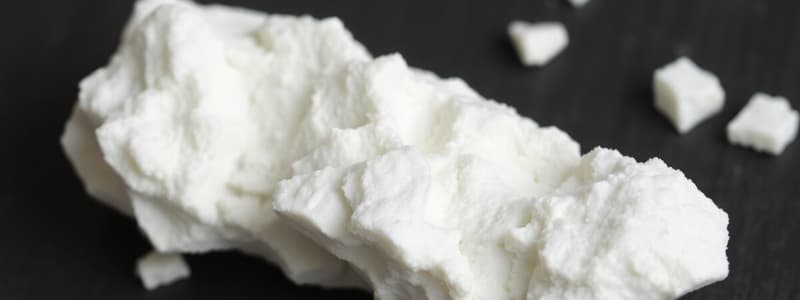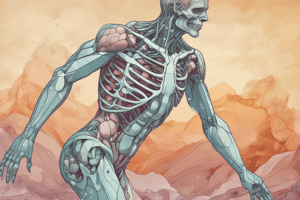Podcast
Questions and Answers
What is the primary function of calcium in the human body?
What is the primary function of calcium in the human body?
- Regulating heart rate
- Aiding the formation of strong bones and teeth (correct)
- Enhancing digestion
- Producing hormones
Which of the following minerals is classified as a macro mineral?
Which of the following minerals is classified as a macro mineral?
- Zinc
- Iron
- Calcium (correct)
- Iodine
What can result from a deficiency of calcium in the body?
What can result from a deficiency of calcium in the body?
- Increased risk of bone diseases (correct)
- Increased energy levels
- Improved muscle relaxation
- Faster blood clotting
What is the recommended daily allowance (RDA) of calcium for teenagers?
What is the recommended daily allowance (RDA) of calcium for teenagers?
Which food source is NOT typically high in calcium?
Which food source is NOT typically high in calcium?
Flashcards
What are macro minerals?
What are macro minerals?
Minerals needed in large amounts, like calcium and phosphorus, that are crucial for various bodily functions.
What are trace minerals?
What are trace minerals?
Minerals that are required in very tiny amounts, but are still essential for health. Iron, zinc, and iodine are examples.
Where is most of the calcium in the body found?
Where is most of the calcium in the body found?
Calcium plays a major role in building strong bones and teeth. Almost all of it is found in these structures.
How does calcium help blood clotting?
How does calcium help blood clotting?
Signup and view all the flashcards
How does calcium affect muscle function?
How does calcium affect muscle function?
Signup and view all the flashcards
Study Notes
Minerals in Home Economics
- Macro Minerals: Required in large quantities. Includes calcium, phosphorus, potassium, and sodium.
- Trace Minerals: Needed in smaller amounts. Includes iron, zinc, and iodine.
- Cool Pandas Play Soccer in Zebra Islands: A mnemonic device for remembering minerals (Calcium).
- Calcium is essential for strong bones and teeth (99% in bones, 1% in blood/nerves/muscles). It also aids in blood clotting and muscle contraction.
Sources of Calcium
- Dairy products (milk, cheese)
- Leafy green vegetables (spinach)
- Almonds
Deficiencies
- Increased risk of bone diseases (osteomalacia, osteoporosis)
- Impaired dental health
- Possible slow blood clotting (haemorrhaging)
- Muscle spasms/cramps
RDA (Recommended Daily Allowance)
- Children: 800 mg
- Teenagers: 1200 mg
- Adults: 800 mg
- Pregnant women: 1200 mg
Studying That Suits You
Use AI to generate personalized quizzes and flashcards to suit your learning preferences.




